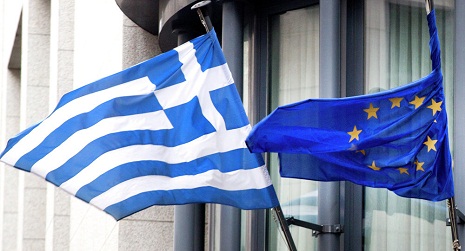The leftist government was elected in January on pledges to end austerity measures that came with its 240 billion euro bailout agreement. After acrimonious negotiations in February, Athens got a bailout extension to the end of June and promised not to make any unilateral moves that could burden its budget.
With tensions still running high, Greece attacked comments by Jeroen Dijsselbloem, head of the Eurogroup of euro zone finance ministers, who said pressure on Athens was growing and an emergency loan depended on real progress on reforms.
He said he wanted no repetition of events in Cyprus in 2013, when "the banks were closed a while, and capital controls - cash flows in the country and out of the country - were tied to all manner of conditions".
Greek government spokesman Gabriel Sakellaridis accused Dijsselbloem of overstepping his role, saying: "We believe it is unnecessary to remind him that Greece cannot be blackmailed."
Tsipras wants German Chancellor Angela Merkel, European Central Bank chief Mario Draghi, European Commission head Jean-Claude Juncker and French President Francois Hollande to join the meeting on the sidelines of the EU summit in Brussels on Thursday and Friday.
It appears to be the latest effort by Tsipras to hammer out a "political solution" to resolve Greece`s funding problems, which are worsening as the country remains shut out of debt markets.
So far, there has been no sign of progress in talks between technical teams from Greece and its international lenders which started last week.
"MEETING OF SUBSTANCE"
A Greek official said Tsipras made his appeal in a phone call to Donald Tusk, president of the European Council, who organises EU summits and coordinates business between the EU`s 28 national governments. Tusk`s spokesman confirmed the contact.
Merkel spoke with Tsipras on Monday and invited him for talks in the German capital on March 23.
At the Brussels meeting, Tsipras plans to reiterate Greece`s commitment to implementing reforms and to raise Athens` cash problems, the Greek government spokesman said.
"It will be a meeting of substance, not a meeting for communication purposes or a `photo opportunity` in Berlin," Sakellaridis said.
A Greek government official announced that Tsipras had accepted an invitation to meet Russian President Vladimir Putin in Moscow on April 8, a month earlier than originally expected.
Tsipras`s government ruffled feathers among EU leaders by suggesting Athens might not support EU policy towards Russia over the Ukraine crisis, but it has rejected talk of turning to Moscow for financial aid.
Greece now needs to agree on reforms that will unlock much needed funds from European partners. But it appeared to roll back on at least one promise when it said overnight that it would rename its privatisation agency and use its revenues for social welfare rather than to reduce its debt.
Appealing for European solidarity, Deputy Prime Minister Yannis Dragasakis called on Greece`s partners to help release the country from a trap.
"The country is in a position like that of Sisyphus — a man condemned to roll a boulder to the top of a hill, only to see it roll down again," he said in an article co-authored with Finance Minister Yanis Varoufakis and deputy minister for international economic relations Euclid Tsakalotos in the Financial Times.
"We risk condemning an entire generation to a future without hope. To avoid that, what we ask from our eurozone partners is to treat Greece as an equal and help us escape from this Sisyphean trap."
More about:















































